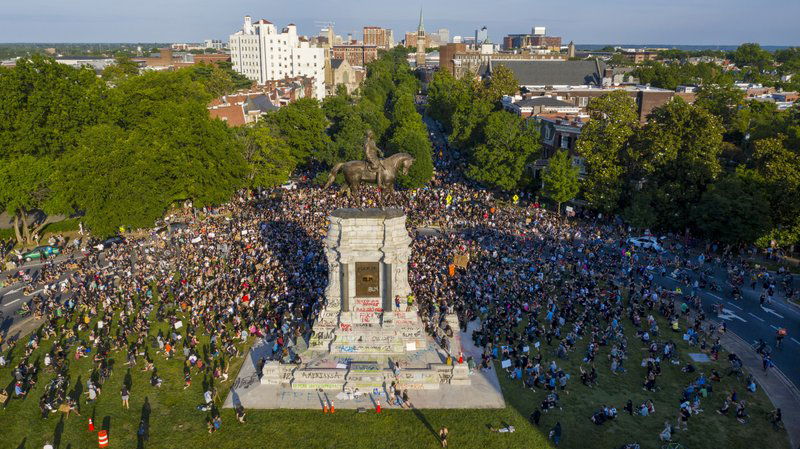Virginia governor to announce removal of Lee statue

RICHMOND, Va. (AP) — Virginia Gov. Ralph Northam is expected to announce plans Thursday to remove one of the country’s premier monuments to the Confederacy, a statue of Gen. Robert E. Lee along Richmond’s prominent Monument Avenue, a senior administration official told The Associated Press.
The Democratic governor will direct the statue to be moved off its massive pedestal and put into storage while his administration seeks input on a new location, according to the official, who spoke on condition of anonymity because the official was not authorized to speak before the governor’s announcement.
Many black activists and lawmakers have long called for the statue’s removal and cheered the news.
“That is a symbol for so many people, black and otherwise of a time gone by of hate and oppression and being made to feel less than,” said Del. Jay Jones, a black lawmaker from Norfolk. He said he was “overcome” by emotion when he learned the statue was to come down.
The move comes amid turmoil across the nation and around the world over the death of George Floyd, a black man who died after a Minneapolis officer pressed his knee into Floyd’s neck for several minutes, even after he stopped moving.ADVERTISEMENT
Floyd’s death has sparked outrage over issues of racism and police brutality and prompted a new wave of Confederate memorial removals in which even some of their longtime defenders have decided to take them down.
The Lee statue is one of five Confederate monuments along Monument Avenue, a prestigious residential street and National Historic Landmark district in Richmond, the former capital of the Confederacy. It has been the target of graffiti during protests in recent days over Floyd’s death, including messages that say “end police brutality” and “stop white supremacy.”
It was not immediately clear when the statue would be removed.
Other tragedies in recent years have prompted similar nationwide soul searching over Confederate monuments, which some people regard as inappropriate tributes to the South’s slave-holding past. Others compare monument removals to erasing history.
Confederate memorials began coming down after a white supremacist killed nine black people at a Bible study in a church in South Carolina in 2015 and then again after a violent rally of white supremacists in Charlottesville in 2017.
Also on Wednesday, Richmond Mayor Levar Stoney announced plans to seek the removal of the other Confederate monuments along Monument Avenue, which include statues of Confederate President Jefferson Davis and Confederate Gens. Stonewall Jackson and J.E.B. Stuart. Those statues sit on city land, unlike the Lee statue, which is on state property.
Stoney said he would introduce an ordinance July 1 to have the statues removed. That’s when a new law goes into effect, which was signed earlier this year by Northam, that undoes an existing state law protecting Confederate monuments and instead lets local governments decide their fate.
“I appreciate the recommendations of the Monument Avenue Commission – those were the appropriate recommendations at the time. But times have changed, and removing these statues will allow the healing process to begin for so many Black Richmonders and Virginians,” Stoney said. “Richmond is no longer the Capital of the Confederacy – it is filled with diversity and love for all – and we need to demonstrate that.”
Bill Gallasch, president of the Monument Avenue Preservation Society, said he worried the statues’ removal would change the “soul” of the street, hurt tourism in Richmond and stir up violence between far-right and far-left groups.
The monument removal plans also drew criticism from the Virginia Division of the Sons of Confederate Veterans.
“We’re allowing the mob to dictate what will and will not be in the public domain,” said B. Frank Earnest, a spokesman for the group.
But Joseph Rogers, a descendant of enslaved people and an organizer with the Virginia Defenders for Freedom, Justice and Equality, said he felt like the voices of black people are finally being heard.
“I am proud to be black, proud to be Southern, proud to be here right now,” he said.